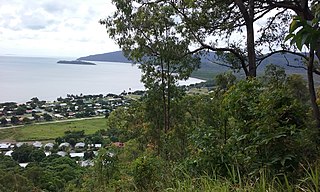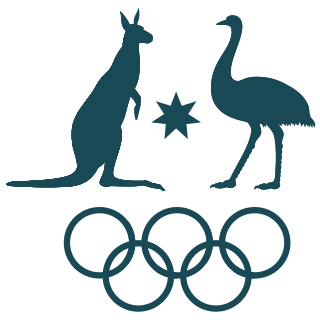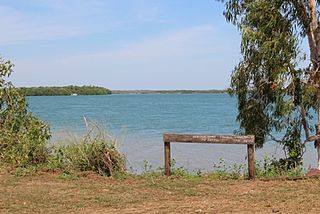The Rock Eisteddfod Challenge, also known as the Australian Rock Eisteddfod Challenge, was an Australian dance and drama challenge for government-funded high schools that was active between 1980 and 2012. Initiated by the Rock Eisteddfod Challenge Foundation as part of the Global Rock Challenge, the aim of the event was to promote healthy lifestyle choices, particularly abstinence from drugs, alcohol and cigarettes. The event started in Sydney, New South Wales in 1980 and subsequently spread to other States and territories of Australia and a small number of other countries.

Lowitja Lois O'Donoghue Smart, is an Aboriginal Australian retired public administrator. In 1990-1996 she was the inaugural chairperson of the Aboriginal and Torres Strait Islander Commission (ATSIC). She is patron of the Lowitja Institute, a research institute for Aboriginal & Torres Strait Islander health and wellbeing.
Recreational drug tourism is travel for the purpose of obtaining or using drugs for recreational use that are unavailable, illegal or very expensive in one's home jurisdiction. A drug tourist may cross a national border to obtain a drug that is not sold in one's home country, or to obtain an illegal drug that is more available in the visited destination. A drug tourist may also cross a sub-national border to do the same, as in cannabis tourism, or purchase alcohol or tobacco more easily, or at a lower price due to tax laws or other regulations.

Yarrabah is a coastal town and locality in the Aboriginal Shire of Yarrabah, Queensland, Australia. It is an Aboriginal community. In the 2021 census, the locality of Yarrabah had a population of 2,505 people.
Reconciliation Australia is a non-government, not-for-profit foundation established in January 2001 to promote a continuing national focus for reconciliation between Indigenous and non-Indigenous Australians. It was established by the Council for Aboriginal Reconciliation, which was established to create a framework for furthering a government policy of reconciliation in Australia.

The Australian Olympic Committee (AOC) is the National Olympic Committee responsible for developing, promoting, and protecting the Olympic Movement in Australia. The AOC has the exclusive responsibility for the representation of Australia at the Olympic Games, the Youth Olympic Games and at Regional Games patronized by the International Olympic Committee (IOC). All National Olympic Committees are constituents of the International Olympic Committee.
Alcohol education is the practice of disseminating information about the effects of alcohol on health, as well as society and the family unit. It was introduced into the public schools by temperance organizations such as the Woman's Christian Temperance Union in the late 19th century. Initially, alcohol education focused on how the consumption of alcoholic beverages affected society, as well as the family unit. In the 1930s, this came to also incorporate education pertaining to alcohol's effects on health. For example, even light and moderate alcohol consumption increases cancer risk in individuals. Organizations such as the National Institute on Alcohol Abuse and Alcoholism in the United States were founded to promulgate alcohol education alongside those of the temperance movement, such as the American Council on Alcohol Problems.
Drug education is the planned provision of information, guidelines, resources, and skills relevant to living in a world where psychoactive substances are widely available and commonly used for a variety of both medical and non-medical purposes, some of which may lead to harms such as overdose, injury, infectious disease, or addiction.

Aurukun is a town and coastal locality in the Shire of Aurukun and the Shire of Cook in Far North Queensland, Australia. It is an Indigenous community. In the 2016 census, the locality of Aurukun had a population of 1,269 people.

The Australian National Aboriginal and Torres Strait Islander Education Policy (AEP) is a national policy adopted by the Government of Australia by each State and Territory government. The policy was first introduced in 1989 and is the foundation of education programs for all Indigenous Australians.
The Australian National Council on Drugs (ANCD) describes itself as "the principal advisory body to Government on drug policy and plays a critical role in ensuring the voice of the community is heard in relation to drug related policies and strategies." The Council occupies a unique position by virtue of its role in enhancing the partnership between the government and the community. It has pivotal advisory, advocacy and representative functions, with a significant role to provide government Ministers with independent, expert advice on matters related to licit and illicit drugs.

Alcohol is commonly consumed and available at pubs and liquor stores in Australia – all of which are private enterprises. Spirits can be purchased at liquor stores and pubs, whereas most grocery stores do not sell them, although they may have separate liquor stores on their premises. Alcohol consumption is higher, according to WHO studies, than in most European countries and several Central Asian and African countries, although consumption is just as high in Australia as in North America. After tobacco, alcohol is the second leading preventable cause of death and hospitalisation in Australia.

The Ted Noffs Foundation is a charitable organisation located in Randwick, New South Wales, Australia. Founded as the Wayside Foundation in 1971 in Sydney by the Reverend Ted Noffs and his wife, Margaret, which provides drug and alcohol services for young people in Australia.
Indigenous Australians are both convicted of crimes and imprisoned at a disproportionately higher rate in Australia, as well as being over-represented as victims of crime. As of September 2019, Aboriginal and Torres Strait Islander prisoners represented 28% of the total adult prisoner population, while accounting for 2% of the general adult population. Various explanations have been given for this over-representation, both historical and more recent. Federal and state governments and Indigenous groups have responded with various analyses, programs and measures.

Great Palm Island, usually known as Palm Island, is the largest island in the Palm Islands group off Northern Queensland, Australia. It is known for its Aboriginal community, the legacy of an Aboriginal reserve, the Palm Island Aboriginal Settlement. The original inhabitants of the island were the Manbarra people, also known as the Wulgurukaba, who were removed to the mainland by the Queensland Government in the 1890s. The island is also sometimes referred to as Bwgcolman, which is the name given to the Aboriginal and Torres Strait Islander people from disparate groups who were deported from many areas of Queensland to the reserve in 1918, and their descendants.
The Stronger Futures policy is a multifaceted social policy of the Australian government concerning the Aboriginal population of the Northern Territory. It is underpinned by the Stronger Futures in the Northern Territory Act 2012, which ceases to have effect 10 years after its commencement on 29 June 2012.

Indigenous health in Australia examines health and wellbeing indicators of Indigenous Australians compared with the rest of the population. Statistics indicate that Aboriginal Australians and Torres Strait Islanders are much less healthy than other Australians. Various government strategies have been put into place to try to remediate the problem; there has been some improvement in several areas, but statistics between Indigenous Australians and the rest of the Australian population still show unacceptable levels of difference.
The Closing the Gap framework is an Australian government strategy that aims to reduce disparity between Aboriginal and Torres Strait Islander peoples and non-Indigenous Australians on key health, education and economic opportunity targets. The strategy was launched in 2008 in response to the Close the Gap social justice movement, and revised in 2020 with additional targets and a refreshed strategy.
The Qld Murri Carnival is an annual four-day rugby league carnival for Aboriginal and Torres Strait Islanders Queensland rugby league teams. Queensland Rugby League (QRL) has awarded the Arthur Beetson Foundation with the tender for the next few years to host the Qld State Championships as part of the Carnival. The Foundation has employed MRL Qld Pty Ltd to event manage the Murri Rugby League carnival.
Smoking in Australia is restricted in enclosed public places, workplaces, in areas of public transport and near underage events, except new laws in New South Wales that ban smoking within ten metres of children's play spaces.








